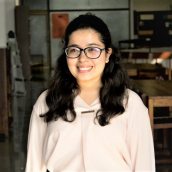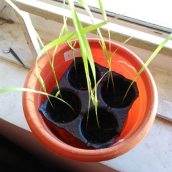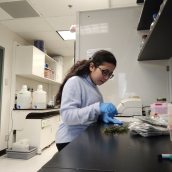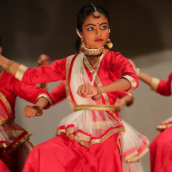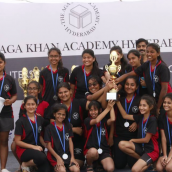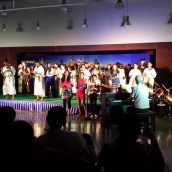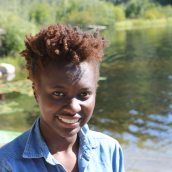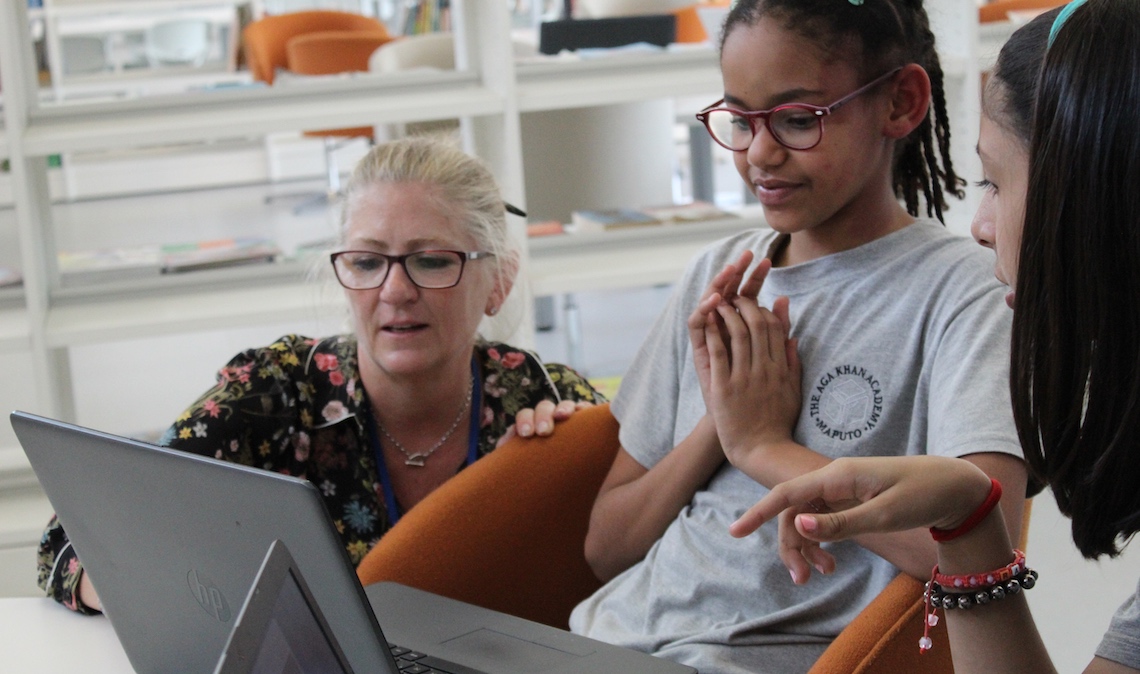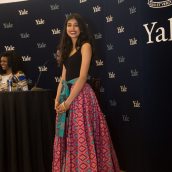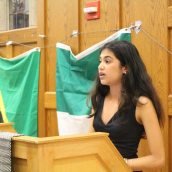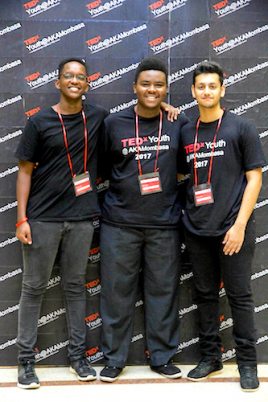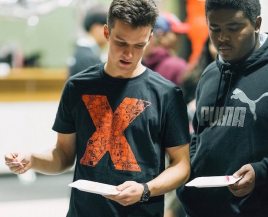Senior School application form
Senior School application form
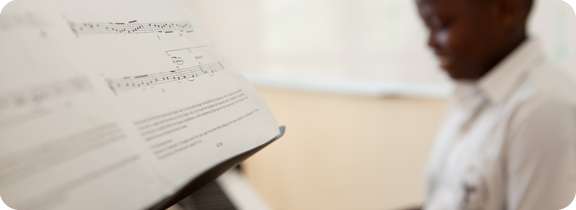
Co-curricular Programmes
Co-curricular programmes enable students to realise their potential in a variety of settings beyond the classroom. Students develop a sense of self-awareness and an understanding of school and community needs and opportunities. They also learn how to apply their gifts and skills to make a positive impact.
At the Academy, we believe in a balanced, rounded, comprehensive school experience. As this includes both academic and co-curricular experiences, we encourage our students to do their best both in and outside the classroom.
We will offer outstanding sports facilities that will include:
- swimming and diving pools
- cricket, soccer and hockey pitches
- basketball and volleyball areas
- tennis and squash courts
- dance studio
- gymnasium
- athletics tracks.
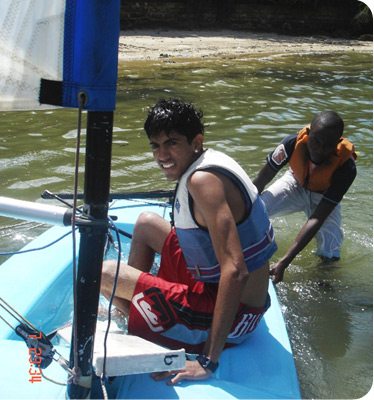 Children with special sporting gifts will be encouraged to develop their talents in every way. Children with special gifts in music, art or drama will similarly be encouraged through opportunities to practise and perform while at the Academy.
Children with special sporting gifts will be encouraged to develop their talents in every way. Children with special gifts in music, art or drama will similarly be encouraged through opportunities to practise and perform while at the Academy.
Our co-curricular programmes are clustered into three main streams, each with a different focus:
Creative Expression
Whether through visual or performing arts, this cluster engages students to think creatively and express their identities and thoughts aesthetically. Through theatre, art, music and drama, students learn to work together and infuse their projects with values and lessons from other parts of their schooling. Individual and collaborative creative projects emphasise growth and development through personal challenge, ultimately resulting in achievable personal goals.
Action
The student as a reflective practitioner is a basic tenet of the Action cluster. Through physical sport—both competitive and non-competitive—students are challenged in their physical growth, and learn values such as good sportsmanship, teamwork and ethical behaviour. We encourage them to extend themselves by trying different activities and working with teammates to pass on their knowledge. In line with developing the student as a whole, a healthy lifestyle complements and enhances academic achievement.
The Academies will be concerned with the whole of the human being—mind, body and spirit—and with the broad range of human aspiration—intellectual, moral, artistic, physical and spiritual. The fact that these are residential academies will contribute enormously to these broad objectives, encouraging students to identify more completely with the school, to help lead it and shape its environment.
The Academies will be concerned with the whole of the human being—mind, body and spirit—and with the broad range of human aspiration—intellectual, moral, artistic, physical and spiritual. The fact that these are residential academies will contribute enormously to these broad objectives, encouraging students to identify more completely with the school, to help lead it and shape its environment.
Citizenship
At the Academy, we encourage knowledge and understanding of humanity and civil society. Through their involvement in citizenship activities, students gain an understanding of the practical implications of their work and study. By collaborating with community groups on sustainable projects, they develop an appreciation for human rights and human dignity, and of how their actions impact the world around them.
To learn more about the Academy's programme, please visit the Academic Programme page.
Rajan Thampi: Working for a cause
Rajan has played this role of connecting students to resources for his entire career. His work with Aga Khan Education Services began in 2008 in Maheshwaram Mandal, present day Telangana, where he implemented outreach programs for government schools and anganwadis. Rajan was in charge of programs like introducing life skills to high schoolers, leading health programs for adolescent girls, organising inter school sports competitions, and also training teachers for pre-primary and primary schools. Rajan’s other responsibility at that time, something he is still involved in, is creating and maintaining relationships with government officials.
A significant part of outreach depends on securing permission and getting recognition from government education bodies. Rajan played a major role in getting junior and senior schools recognised by the authorities. Rajan thanks the people who support the outreach department in these endeavors - the Academies Unit and members of the local board, Suleiman Hirani and Jayanthi.
Born in Kerala, the second of five siblings, Rajan grew up in Shakkarnagar, Telangana. Shakkarnagar is home to historical industrial era sites built under the Nizam. Most significant among these sites is the 1,600 square kilometer Nizam Sugar Factory that the town gets its name from. Designed as a model town, the place was built for factory employees and their families. “My father was an accountant in the factory,” remembers Rajan, “and we use to live in the accommodation provided by the factory in its colony.” Madhu Malancha high school, where Rajan went, was also created and funded by the factory. But India’s sugar trade has been in decline for decades, and in his lifetime Rajan has had to see the closure and privatisation of the massive factory. “Asia’s largest sugar factory is now shut,” he muses.
After completing senior school, Rajan gained a Bachelors in Commerce and started teaching at a private school. Finding his calling, Rajan then pursued a Bachelors in Education, focusing on social studies and education. Today he also has a Masters degree in social work under his belt. To Rajan, these degrees are tools to help others. Asked about the outreach department's future plans, his responses are ambitious and focused. “Reaching out to 31 districts of Telangana,” he says, “and to continue to share expertise through collaborative discussion forums for the government teachers are some of my plans.”
“Inner delight,” he says, “and the satisfaction obtained from working for a cause are the rewards I seek from my work." If the outreach program is a manifestation of the ethos behind service and stewardship, then Rajan exemplifies those ethos.
Sarah Keshvani (Class of 2018): using biology to tackle environmental challenges
Sarah’s love for the sciences flourished during the Diploma Programme (DP) at the Academy in Hyderabad. Through her extended essay, she found the opportunity to learn more about how biology can provide solutions to modern challenges faced in local communities. She decided to tackle the issue of water shortages and soil nutrient deficiencies hindering large scale rice cultivation in the state of Telangana, leading to reduced crop yields. Due to zinc deficiencies in the soil, farmers resort to using huge amounts of fertilisers, which further degrade soil quality.
Sarah’s research centred on hydroponics as a possible solution to this problem. Plants are grown in water-based, nutrient solutions instead of soil.
“This technique has recently garnered a lot of attention because experiments have shown that growth is more than doubled when compared to traditional methods of agriculture,” Sarah explained. “Nutrient uptake is more efficient, and farmers can control the type of nutrients the plant is exposed to, in order to enhance different features of the yield. The use of water in hydroponics is still much more efficient than how it is used in open paddy fields that need to be covered in water during certain times of the crop cycle.”
Sarah’s conclusions were positive. Rapid growth was observed and the flexibility to control the nutrient uptake played a huge role in optimal plant health. She realised that a closed system would have provided more accurate results, as the higher evaporation rates disturbed the pH levels. Overall though, she deduced this technique could definitely tackle the challenges faced by paddy farmers.
“The IB curriculum followed at the Academy has played a pivotal role in building many essential skills for university life,” Sarah reflected when asked how she has settled into this new phase. “The emphasis on academic integrity and independence have served me really well here. I was taught to think critically rather than blindly follow textbooks. Its skill-based learning approach, and connecting classroom learning to the real world, also prepared me well for higher education.”
Anahita Aman: Grateful for the Academy’s holistic approach to learning and development
Anahita Aman is in her seventh year at the Aga Khan Academy in Hyderabad. Having started there in grade 5, she is now a grade 11 student in the Diploma Programme. She is wise beyond her years and yet has a youthfulness that is contagious. She is full of hopes and dreams and strives to get the most out of her days at the Academy so that she can ultimately give back to the community and society at large.
For Anahita, the strongest part of the Academy is its holistic approach to student development. “They don’t just focus on the academics but also on sports, music and art – so in that way it’s a really holistic approach to learning, and it’s helped me develop into a multidimensional and multifaceted person,” Anahita says. This holistic approach means that she gets the freedom to explore her passions, and that excites her. She loves music – whether it be singing, playing the keyboard and tabla, or learning Indian dance. She is also a self-proclaimed feminist who is passionate about gender-based violence, gender equality and education for girls. She recently had the chance to fuse these two passions as part of a personal project requirement at school. She wrote, composed, and performed her own songs with powerful messages on these topics.
This year, Anahita made a shift to the residential programme and says that it has been a great learning experience – one that has forced her to come out of her shell. She has learned how to better manage herself and her time, and she has become more independent and more social. “I learned how to adapt to my surroundings, how to adjust with other people and to make things work.” But Anahita feels that she has grown in other ways also, and this stems again from the holistic approach of the Academies.
“Service and action is mandatory as a part of the curriculum…they emphasise the need for community awareness, for concern about society, and they emphasise the need to give back and to make positive and effective contributions to society.” For the service and action component of the Academy’s programme, Anahita was part of fundraising teams that raised money for nearby government schools to install water filtration systems and purchase sports equipment, among other things. “We don’t look at it as an obligation or a compulsion but we do it out of passion, and the Academy gives us that passion, that feeling or need to give back to society,” Anahita says. She is proud of her service accomplishment along with many others that the Academy has also helped her to achieve.
She is a member of the journalism club and has made great strides in her writing skills, including how to better articulate her thoughts. She has taken part in a national sports tournament where she represented her school in football and track and field, having won a silver in high jump. And she has been part of the Model United Nations where she not only got a real sense of how the world works, including how people live and what the prevalent issues are, but also developed skills in public speaking, problem solving and knowledge application. Anahita says, “The Academy helps us apply this knowledge to real-life situations.”
The holistic approach to learning and development that the Academy takes is something that Anahita believes makes it unique. But there are other things too. For one, there is no spoon-feeding. Instead, you’re taught how to learn and how to learn on your own – the approach is not one of rote learning but rather application of real-life situations. She’s also really happy that the Academy creates a safe space. “We have that sense of comfort that there’s no pressure of performing and we have the space to experiment with things. We don’t feel pressure at any point, we don’t feel stressed, and we don’t look at exams as huge challenges but as small barriers that we can overcome.”
Anahita also believes that the Academy’s mission and vision are both important and inspiring. In fact, it was the mission that attracted her parents to send her there. “It teaches us to be culturally rooted and diverse. It teaches us how to accept our differences and so we have this feeling of community,” says Anahita. The Academy also aligns within the framework of the International Baccalaureate (IB) programmes. As such, the attributes of its learner profile are very powerful in instilling life values. All of this is what she believes make it distinct from many other schools.
Anahita credits the Academy for helping her become less shy and less self-conscious. She says, “I feel like I have the comfort to be who I am and to express myself freely. I feel acknowledged and I feel I’m being appreciated for who I am.” When asked if there was any particular person at the Academy that played a big part in this, or whether there was someone she really looks up to, she says that she doesn’t account only one person as a role model but instead looks to the many amazing people she has met along the way for their different but equally important attributes. “I may like someone’s enthusiasm, someone’s hard work and dedication, the way they work with people, the way they bring people together,” Anahita says. “I like to get inspired by these characteristics, by these attributes from different people and imbibe them into myself to be the best person I can be.”
Anahita’s future looks bright. While she is still unsure of what exactly she wants to do, she has learned how to articulate her passion, and that in itself has given her a sense of determination. She hopes to be able to combine her interests in music and literature with humanities and gender studies. She imagines perhaps becoming a poet or musician and incorporating important messages into her work. “I think the Academy is giving me the space and the platform to explore what I’m actually interested in,” Anahita says, “and I think that will lead me to my ultimate ambition.”
By Ceisin Popat
Mirabelle Arodi (Class of 2012): Working Towards a Healthier Future
Indeed, the importance of these values to Mirabelle Arodi is obvious in her actions after graduation from the Academy.
Moving from Nairobi to join the residential programme at the Academy in Mombasa, Mirabelle Arodi has come leaps and bounds. She was one of many students at the Academy on financial aid and reiterates her gratefulness for the access it gave her to an excellent education. She joined the AKA Mombasa community in September 2010 and graduated in 2012. She was also awarded a full scholarship at The University of British Columbia (UBC) in Canada and is studying for a Bachelor of Science in Medical Biochemistry. She has had a very eventful university career so far, and hopes to graduate with her degree in the summer of 2016.
While at university, she has worked as a residence advisor for two years now, building a community and running different events and programmes to help enrich student’s experiences while living in residence. Her own experience as a residential student at the Academy has allowed her to fulfil her responsibilities even more effectively.
“The weekly activities such as family dinners and Saturday night activities also stimulated me intellectually and allowed me to interact with students of all ages and backgrounds, which made the experience of living in residence all the more enriching," she recounts. "This is something that I strive to create as a residence advisor here in university.”
She has also worked as a research assistant with two different professors: one, as a lab assistant in a Biological Solutions in Engineering research project, and another for economics-based solutions to water systems in British Columbia. This past year, she was also part of the planning committee for the 7th UBC Okanagan Student Leadership Conference, which was attended by over 200 university and high school students. In addition, last year she was able to attend the Berkeley Model United Nations Conference as a delegate representing UBC Okanagan. This year, she is part of the executive committee for the UBC Okanagan Model United Nations Club (UBCO MUN), in which she helped train delegates for an external international conference, organised a football tournament for over 100 people and is currently helping to organise the UBCO MUN Conference in late January. In the future, Mirabelle hopes to go to medical school and eventually return to Kenya where she intends to work in public health and raise the standards of healthcare.
Mirabelle also valued the advice she got at the Academy in terms of preparing her for life in university and beyond.
“I definitely had excellent university counselling at the Academy and was able to get my first choice of university. The process was made very easy and smooth by the structure of weekly university counselling sessions in which I was able to perfect my personal essays. In addition, the availability of the counsellors, even outside of school hours, was a huge help and I was able to get constant support and feedback. The willingness of other teachers as well, not just counsellors, to help in the university applications was much appreciated.”
But Mirabelle valued her experience at the Academy for more than just getting her to university.
“The Academy definitely enhanced my intercultural fluency, which has been very valuable in interacting with the diverse student and staff population at university. Its emphasis on being well-rounded also helped me to pursue different interests other than just academics. In addition, the discipline that the Academy instilled in me has enabled me to keep on track at university and not be overwhelmed by the freedom that university offers. This gave me an advantage over other schools that my peers attended; they had more of a hard time adjusting and finding their footing.”
She also reflects on the way her time at the Academy affected the way she lives her life outside the academic sphere.
“I think one of the most important values that the Academy instilled in me is critical thinking. My peers often ask me why I ask so many questions about everything and I believe this is a testament to the Academy encouraging critical thinking not only in academics through theory of knowledge [a mandatory multidisciplinary course taken by all students in the Diploma Programme], for instance, but also through involvement in other extracurricular activities. I believe that always reflecting and analysing has helped me narrow down the interests I pursue in university because I am able to discern why I am doing what I am doing and how it will impact me and those around me. In doing so, I am able to get as much meaning and value out of every activity that I pursue.”
Mirabelle is still actively involved in the local community at the UBC Okanagan campus.
“I am currently taking on a legacy project that has been going on at the university for the past three years. It is a cultural fashion show in which we have students model and represent clothing from different countries in the world, as well as entertainment in the form of dances, for example, from different countries. The show is a fundraiser and this year we will be supporting local charities in the Okanagan. In doing so, we will be more engaged with the surrounding community and be able to tangibly see the effects of our fundraising efforts.”
When looking back on her choice to pursue the International Baccalaureate (IB) Diploma Programme, she recognises the value it brought to her academic capability and how it set her apart from her peers who came from different systems.
“I highly value the IB curriculum and completely credit it with me being where I am now; at a well-renowned university on a full scholarship, excelling in both academic and extra-curricular activities. The IB was definitely very challenging, and the workload prepared me very well to handle the first and second years of university. My peers did not find it as easy to meet the academic demands of school. In addition, the IB helped me balance school work while still being actively engaged in extracurricular activities which has been very valuable in enriching my university experience so far. Lastly, the course content of the IB is at a very high level, which enabled me to better understand university courses and in some cases, allowed me to skip ahead and take more advanced courses in my first and second years.”
Her passion for excelling and engaging with issues that are important to her shows no signs of waning. She feels strongly about problems regarding the lack of adequate healthcare in particular.
“I believe that healthcare is incredibly important and should be a right rather than the privilege it is in some areas of less economically developed countries. If I had all the resources at my disposal, this is where I would focus; ensuring that medical care is easily accessible and affordable for all.”
Rebecca Nichols: Seeing Endless Possibilities for the Future of AKA Maputo
Engaging Students to Become Stake-Holders in the Future of the Academy
For the Middle Years Programme (MYP) Coordinator, Rebecca Nichols, the sky is the limit when envisaging the future of the Aga Khan Academy in Maputo, Mozambique. More importantly, in her eyes, how the Academy keeps growing, shaping and expanding its role in the country and beyond must lie in the hands of students.
“I would like to see our students take responsibility for what our school should become,” she states with excitement, squarely placing the emphasis on student-centred leadership. “I look forward to hearing their ideas for new initiatives, and I look forward to AKA Maputo becoming a school on the African continent from which leaders emerge,” she adds with resolute clarity.
Listening to the details of Rebecca’s background, education, and experience is highly entrancing. Born in the United Kingdom, she spent the early years of her life in Kenya before moving to the Ashanti Goldfields in Ghana for a few years and then back to Great Britain where she obtained her university-level education.
Armed with Master’s Degree in Education from the University of Bath and a post-graduate certificate in Education from the University of Sheffield, Rebecca has taught schools in Portugal, Angola, Kenya, Sweden, Spain, Italy and Hong Kong. In addition, she has worked as an International Baccalaureate (IB) Diploma examiner, an MYP workshop leader and an independent educational consultant for schools in various parts of the world. She is currently pursuing a Doctorate Degree in Education. A British citizen, Rebecca says of her background, I think of myself as a transcultural, rather than someone who identifies particularly with the UK.”
The Academy’s IB Programme is rich in Curricular Strands of ethics, pluralism, economics for development, cultures, governance, and civil society. These play a vital role in Rebecca’s teaching as she incorporates them in her instruction.
“I teach English language and literature and am always able to explore texts and language through the lens of the IB Programme’s Curricular strands,” she notes. “Currently, some of my grade 6 and grade 7 students and are studying Shakespeare’s ‘The Tempest,” and we have explored the themes of governance and civil society in the play.”
Mutual respect and mutual trust between students and also between students and teachers are of paramount value for a thriving classroom. How does Rebecca ensure that this environment exists in her classroom?
“By listening to one another. By supporting one another. By helping one another reach their potential.”
Recognising the importance the Academy attaches to incorporating pluralism and the one-family feeling in the school, Rebecca states of the teachers, “We do a lot of work on team- building activities and also try to engage our students in undertakings that will enable them to develop a sense of community, a sense of family.”
Students, too, participate in this responsibility of developing a sense of belonging. “Our students have set up an after-school programme called “Teen Talks” that enables them to discuss their feelings, experiences and, concerns,” Rebecca says. “Their openness to one another ensures that a climate of pluralism flourishes within the Academy.”
Although Rebecca values her students and works hard to educate them, she feels an excellent education must involve parents. “Any outstanding education must involve three parties; the students, the parents/guardians and the teachers,” Rebecca is quick to note. “I communicate a lot with parents through monthly coffee mornings, emails and events to which parents are invited. I especially look forward to the parent-teacher conferences.”
Radiating ambition for her students to become independent thinkers, even while working in groups, Rebecca designs projects that foster independent thinking skills.
“I create exciting, relevant units of work that expose them to a range of language and literature from a variety of contexts,” she states. I encourage them to be creative, to work independently, in pairs and as part of a group. I provide detailed feedback and expect students to be able to provide meaningful feedback to one another,” she pauses. And then continues, “I encourage them to take risks, to read widely and to learn about the world beyond our campus fences. I encourage them to try things they have never done before.”
Cherishing her time at the Academy, Rebecca feels the experience she is acquiring will continue to resonate with her throughout her life. “Working at the Academy has enabled me to become a more effective multitasker who is willing and able to take on a wide variety of roles that support teaching and learning,” she muses. “I believe that this is an exciting time for the Academy and look forward to being part of the journey.”
Ruhi Kamal Manek (Class of 2016): Advocating for Africa
Ruhi Kamal Manek, an alumnus of the Aga Khan Academies in Mombasa and now a sophomore at Yale University in the United States, took away one enduring lesson from the Academy: the importance of engaging in thoughtful and careful consideration of diverse opinions. She explains that it was her time at the Academy that forced her to reexamine her old-world views and believes that her new way of thinking as a citizen of the world was borne of her stay in residence at the school:
“Living with people from so many diverse backgrounds helped me appreciate differences in people. This experience further helped me feel comfortable interacting with people from diverse backgrounds and diverse cultures at Yale.”
Ruhi was born in Nairobi, Kenya and grew up in the small town of Eldoret. It was her desire to learn and challenge herself more that made her apply to the Academy.
“I could not think of a better place to do that than at the Academy,” Ruhi states. “Being admitted to the school was the beginning of a transformative journey for me - a defining moment in my academic and personal life.”
The Academy places immense importance on meaningful public service. Ruhi participated in numerous voluntary undertakings but it was involvement in the annual school-based deworming program in the impoverished Bombolulu area of Mombasa that had a lasting impact on her. Under this program, school children receive an oral dose of deworming medicine designed to lower their risk of infection by worms and thus enhance their health and school productivity.
“The experience opened my eyes,” Ruhi says. “The thought that something so trivial as administering a few drops of medicine in a child’s mouth can transform that child’s future was inspiring to me.”
Involvement in this program inspired Ruhi in many ways. Watching the children joyfully engage with life forced her to reflect on values of humility, modesty and gratification:
“As I stood among the children, I felt as though my heart had grown twice as large, making space for these beautiful souls. I was filled with an inexplicable amount of joy as I marveled at the contentment and optimism around me. Despite the conditions in which the children lived and learned, they were radiating with happiness. I was in awe. The whole experience reminded me of a quote by the Buddha: ‘The cessation of desire is the cessation of suffering.’”
After this experience at the Academy, Ruhi continued her volunteer work at Yale. She is part of the TEDxYale team and helps to organize seminars and conferences. She is a member of Yale UNICEF and is involved in fund-raising efforts to make a difference in children’s lives globally. Committed to women’s rights regarding education and leadership roles, Ruhi also joined the Yale chapter of the Circle of Women, a non-profit organization “that educates, inspires and empowers women to become leaders and peacemakers.”
Additionally, Ruhi is involved in developing a wellness curriculum for a girls’ secondary school in Orkeeswa, Tanzania, which promotes the ideas that healthy students are better learners and that focusing on wellness now can produce huge intergenerational benefits.
“My first year at Yale has undoubtedly been enhanced through my participation in activities that I have long been passionate about,” states Ruhi. She unequivocally credits the Academy’s International Baccalaureate (IB) curriculum and the residential program for her growth and personal development. “My journey at the Academy was one of the most intense yet fulfilling growth periods of my life. I think it is safe to say that it played a key role in helping me develop the person I am today.”
When asked what her aspirations are for the country of her birth, Ruhi radiates determination. “I want to help redefine the way in which the rest of the world views my country, and more particularly the African continent. I want to be an active agent in ensuring that our stories are no longer told for us but by us.”
She is also determined to promote education in her country. “I want to tackle the issue of the lack of education. I value nothing more than the education I have been so privileged to receive and the many opportunities that have come my way because of it. I wish to help provide the same for as many people as I possibly can in my country of origin and beyond.”
By Perviz Walji
Newsletter readers please click here to return to the newsletter (browser version)
Bernardo Arsénio: Inspired teacher with a mission
Bernardo learned from the Aga Khan Academies that knowledge cannot just be seen as something that starts and ends in a classroom, but that knowledge should also be applicable outside the classroom to solve real problems in real life.
Bernardo Arsénio’s journey to becoming a teacher started when he was in year 11 of his school in Maputo, Mozambique. He had a history teacher who used to make fun of him in the classroom. “He used to come to my desk and ask me what I was doing in his class,” Bernardo says. The teacher did that continuously throughout the year. This affected Bernardo’s performance and motivation to be in that class. He failed the class that year.
“But then I realised I could not let him win… I knew that I am supposed to be in class to learn and not to just let someone de-motivate me because he thinks I shouldn’t be there." Bernardo went to talk to his principal who allowed him to attend the class with the same teacher in spite of failing the class. Bernardo later realised that he had to change his attitude if his teacher did not change his. “So I started attending his class – I used to do all the assignments, tests and homework. I never missed even one class in the year,” he says. Bernardo’s constant efforts were noticed by the teacher – Bernardo even achieved the highest mark that year. In turn, the teacher’s attitude towards him changed for the better.
By giving an example from his life, Bernardo explains why a healthy relationship between a teacher and a student is so important. Having a teacher who does not care and does not motivate the students can have negative consequences. “It almost happened to me and I did not let it happen. I used the negative motivation to change it into a positive one – that inspired me to become a teacher,” he says vehemently.
Bernardo pursued History at Eduardo Mondlane University in Maputo. After graduating with a degree in History and a minor in Information Management in 2015, Bernardo began teaching history in a private school – Centro de Exames de Admissão. Desiring even more teaching skills, Bernardo took a six-month postgraduate course in 2016 at Universidade Pedagógica, specialising in teaching methodology.
After a rigorous selection process, Bernardo was one of six individuals who were given the opportunity for a year-long exchange at the Aga Khan Academy in Mombasa, Kenya as part of the Teacher Preparation Programme. “I was lucky to be in the group to come to Mombasa. That was when my journey started,” he says. At the Aga Khan Academy Mombasa, Bernardo went through three weeks of intensive English training. He humbly says, “We got support from each and every person in the Academy. To reach this level, for me to be able to communicate and to go to class and discuss a certain topic was all because we got so much help. I was challenged in class and felt I could not do it. When you feel you cannot do it, you think you are drowning but find yourself swimming and coming out of water; it was very meaningful.” Bernardo ended up teaching Humanities and History to students in Grades 6 to 9.
When he came to the Aga Khan Academy Mombasa, the first thing Bernardo noticed was how the students played an important role in their education and how they took the responsibility for their own education. He says, “Back at home, the environment is where the teacher owns the knowledge and dominates the classroom.” He also remembers going to a Theory of Knowledge class at the Academy and noticing how the students did not learn by rote but were encouraged to discuss and make sense of what was being taught. The method by which the class was taught thoroughly impressed him.
At the Aga Khan Academy Mombasa, Bernardo mentions how amazed he was to see such cultural and religious diversity. He took note of the unity with which everyone participated in school, for example by focusing on their similarities instead of their differences. He was also impressed with how sports classes were taught at the Academy, utilised as an opportunity for students to get together and learn about their similarities and differences. Bernardo found the people in Mombasa very warm and friendly and he did not feel far away from home.
Bernardo is now back in Mozambique, teaching at the Aga Khan Academy Maputo. He will continue to be a Humanities and History teacher and is helping support the growth of the Academy as they implement the International Baccalaureate (IB) Middle Years Programme. He strongly feels that a teacher should connect what is being taught to real life. For Bernardo, a teacher must motivate and support the students, and should enable students to develop and become better people.
Muriuki Njonjo (Class of 2017): Giving back through leadership and empathy
My goal in life has always been to be the very best version of myself that I can be. From the time I joined the Aga Khan Academy Mombasa for my International Baccalaureate (IB) Diploma Programme to when I graduated, that was the greatest period of personal growth in my life. The Academy changed my way of thinking, my way of doing things and informed my purpose in life.
Through a strong emphasis on the intrinsic value of education, the Academy had a lasting impact on me. I remember fondly living in residences which undoubtedly prepared me for living away from home in university. Residential life helped form bonds of friendship that I can confidently say will last a lifetime. The wisdom of dorm parents like Mr. Dudi and Mr. Prashant always helped me get through the rough tides of the IB Diploma Programme, and their words are still very much applicable to my daily life today.
In many ways, the Academy added great intrinsic value to me. However, there was more to that. The Academy demands of all its students a contribution. We lived in a space where we all felt we had to bring something to the table to the benefit of the larger community. It was in this sense of collective responsibility that I found my niche as an active member of the AKA Mombasa community. I was privileged to serve the Student Council as Secretary of the Finance Committee, a role that made me a steward of the student body’s finances. Alongside my committee, I approved the allocation of roughly US$1000 towards various service projects organised by students which had an impact on the local Mombasa community. The importance of giving back and empowering the less fortunate is built into the very fabric of the Academy’s mission and that helped me develop a profound sense of empathy.
I had the opportunity to establish a service club known as the Leo Club with the help of the local Lions Club. We went ahead to raise money for corneal transplants. With the help of my mentors Adnan and Aalia Visram, I co-founded the Academy’s first ever TEDxYouth event with my friend Preyansh Kaushik. Through TEDx we provided an incredible platform for members of our AKA Mombasa community to share their unique perspectives with millions of people across the world. TEDxYouth@AKAMombasa remains one of my proudest achievements at the Academy. Alongside my friend Inaara Savani and the constant guidance and support of Ms Alex Holland, I organised a workshop for Year 9 students on the Syrian refugee crisis. This opportunity eventually led me to Uganda in the Summer of 2016, where I volunteered as an English teacher at the Kyangwali Refugee Settlement. I was also honoured to be the Finance Executive of the CanCare club which organises the Academy’s annual blood drive. All these incredible opportunities have taught me valuable skills and have made me a driven person. Of course, all this would not have been possible without the support of my peers and faculty members.
One cannot speak about their time at the Academy without mentioning the rigorous academics geared towards creating critical, analytical and reflective thinkers. It’s through Mr. Vlad’s classes that I discovered my passion for politics because of the power it has to effect change in everyone’s lives. The strength of the curriculum and the way the teachers delivered it definitely prepared me for university workload. This combined with the numerous opportunities to get involved afforded to me ultimately won me a full scholarship to the University of Waterloo in Canada where I am currently majoring in political science and financial economics with Honours.
I still carry the spirit of AKA Mombasa with me. Since joining Waterloo, I have been involved in the organisation of the annual TEDx event, I have delivered a start-up pitch for funding at Velocity, the world’s largest free business incubator, and I have been privileged to join the first incorporated blockchain community management firm in North America as the Head of Public Relations. For now, I will continue to do what the Academy taught me to do best: contribute to my community and live out my potential in my truest self. In future I hope to go back home to Kenya and use my education and skills to help make a difference in people’s lives. Until then, I continue to live in a permanent space of gratitude for the person I am today, which I owe to the Aga Khan Academy Mombasa.